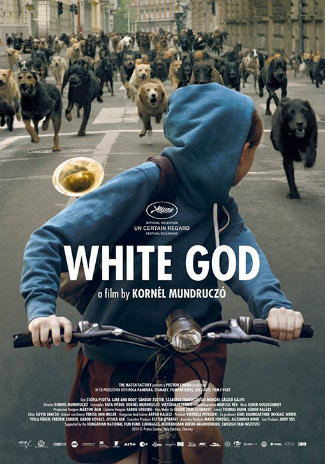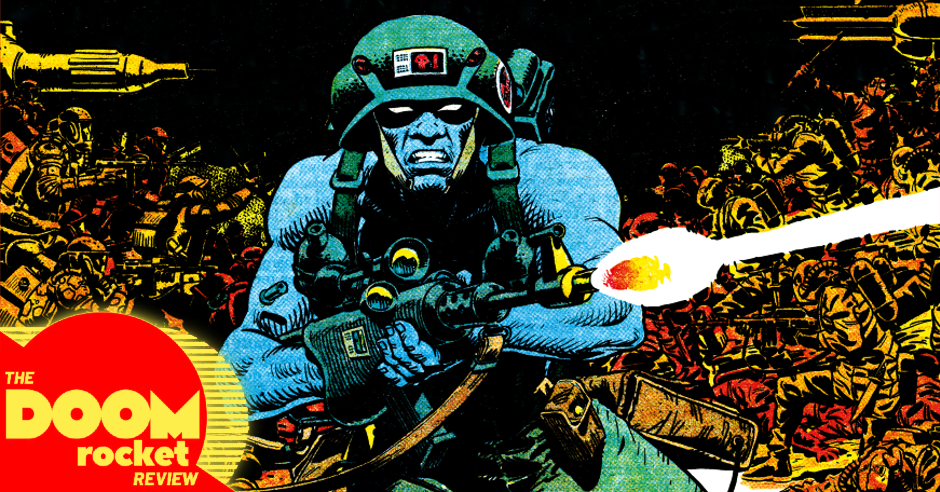 By Kyle G. King. Prix Un Certain Regard is the award section of the Cannes Film Festival reserved for young filmmakers showcasing innovative or otherwise audacious work. Prior to 2014 the name Kornél Mundruczó was far from the festival’s contention, but his latest film White God displays precisely what level of exposure genre work can provide to an ambitious director still willing to work outside their comfort zone.
By Kyle G. King. Prix Un Certain Regard is the award section of the Cannes Film Festival reserved for young filmmakers showcasing innovative or otherwise audacious work. Prior to 2014 the name Kornél Mundruczó was far from the festival’s contention, but his latest film White God displays precisely what level of exposure genre work can provide to an ambitious director still willing to work outside their comfort zone.
With screenwriting help from frequent Hungarian collaborators Viktória Petrányi and Kata Wéber, Mundruczó directs a film that deals with heavy themes of social oppression. But what truly highlights White God as an extraordinary film is that it depicts over 250 stray dogs as its marginalized group (a world record for most dogs used in a film, and for its trouble, White God won the Palm Dog award, which is presented by international film critics for the best performance of a canine or team of canines in a motion picture).
But aiming for more than just quantity, labrador-mix brothers Luke and Body — acting cooperatively as the film’s canine protagonist, Hagen — and cinematographer Marcell Rév together do remarkable work by supplying discerning perspectives for canine characters while also providing subtle social commentary for any stand-in marginalized group.
In White God, Budapest has an immense wild dog problem that is overrunning the city, one that views the “flea-bags” as a disgrace to society (and keeping a mixed-breed dog at home demands a fee and legal registration with city hall). Noose-wielding animal control workers arrive by the van full to corral street dogs into overflowing shelters filled with animals that can’t be euthanized fast enough. 13-year old Lili (played by the commanding Zsófia Psotta) has a deeper reverence for her four-legged friend and promises to never train or attempt to control him; instead she’ll console, support, and accompany him everywhere they go. Their bond is thwarted when Lili spends the summer with her detached father who quickly dismisses Hagen to the harsh streets of Budapest, unwilling to pay the tax demanded to keep his daughter happy. As Lili and Hagen each struggle in their new lives without each other, a story of oppression, entitlement, and overthrowing the powers that be blurs the line of autonomy between its human and canine counterparts.
 Splitting screentime between Lili and Hagen’s respective struggles smartly places dog and human conflict on an equal playing ground, but unfortunately the split is not as well balanced as it could be. Lili’s tale is one of a teenage girl at odds with a father who fails to understand her; a cliche made rich by key performances by its actors, and Psotta gently controls each scene with a simmering teenage angst. Theater director-turned actor Sándor Zsóté is far more flat and rightfully distant as Lili’s estranged father Dániel. Their scenes together are a welcomed reprieve from Hagen’s wordless storyline, but the father-daughter conflict requires far more explanation than that of a species the majority of the audience doesn’t relate to.
Splitting screentime between Lili and Hagen’s respective struggles smartly places dog and human conflict on an equal playing ground, but unfortunately the split is not as well balanced as it could be. Lili’s tale is one of a teenage girl at odds with a father who fails to understand her; a cliche made rich by key performances by its actors, and Psotta gently controls each scene with a simmering teenage angst. Theater director-turned actor Sándor Zsóté is far more flat and rightfully distant as Lili’s estranged father Dániel. Their scenes together are a welcomed reprieve from Hagen’s wordless storyline, but the father-daughter conflict requires far more explanation than that of a species the majority of the audience doesn’t relate to.
White God does best in scenes with Hagen and his army of moseying mongrels. Between low-poised wide angle shots and beautifully smooth dolly work — enhanced by an epic musical score by Asher Goldschmidt — many of the dog-centric scenes evoke a cinematic range from the lunacy of German expressionism to the surreal horror of a Hitchcock film. Framing the rebellious uprising of a huge collection of dogs pays off as an original stroke of cinematic artistry (and a true test of patience) that few films can hold a candle to, but when it comes to working with humans, there are no new tricks to offer. While the Hagen storyline utilizes well trained dogs and smart editing to safely pull off a lot of the more gruesome dog fighting scenes (“No animals were harmed during the making of this film” — I stayed past the credits to see that certification), the same level of intelligence and trust isn’t given over to the human side of the story. While Hagen’s motivations are effective in their simplicity — find food, survive, avenge — Mundruczó overestimates his human actor’s ability to elaborate on poorly realized characters.
While Cannes appreciates the work of animals not played by Andy Serkis (don’t even get us started), the 87th annual Academy Awards did not accept nomination for White God as Hungary’s official submission for best foreign language category. What could have pushed the nomination through is anyone’s guess (the Academy tends to be consistently confusing about nominations and winners), but what White God certainly could’ve benefited from was the real life appreciation that the fictionalized film provided: give the dogs the respect and the screen time they deserve. W.C. Fields’ notorious advice to “never work with children or animals”, is surely outdated given the resources available these days. White God offers more progressive advice: “Work with children and animals, as they are both very cute.”













